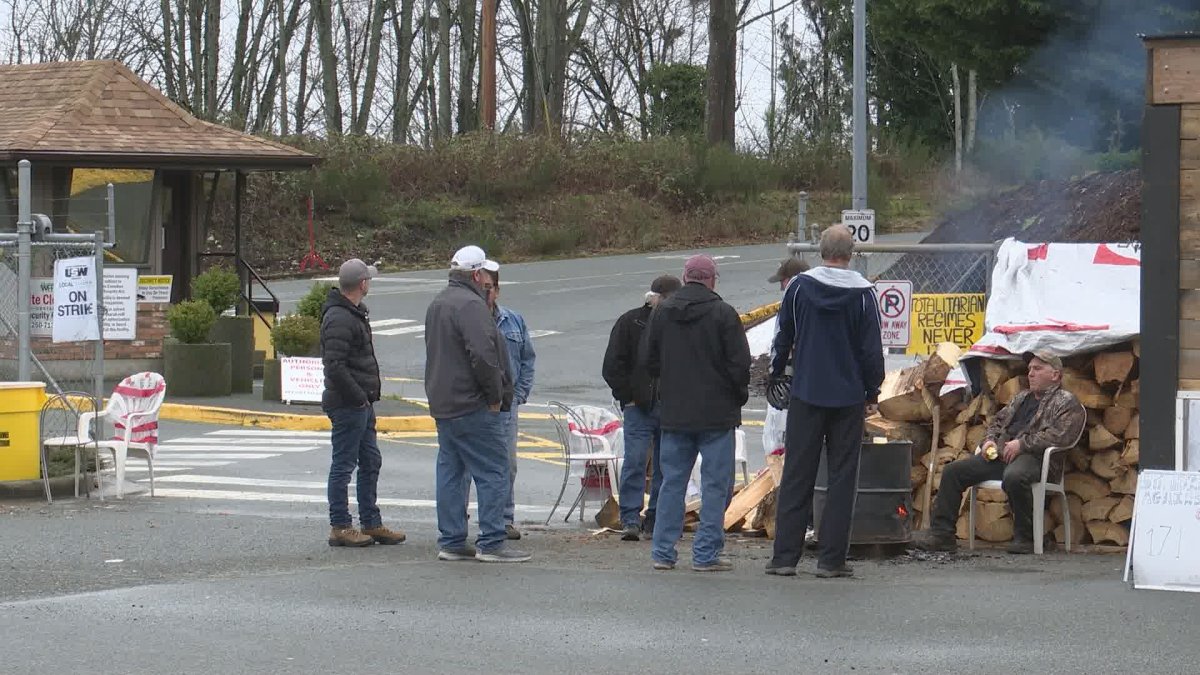An eight-month strike that has devastated communities in northern Vancouver Island has finally come to an end, with the union ratifying a new agreement with Western Forest Products.

United Steelworkers Local 1-1937 announced Saturday that its members had ratified the tentative, five-year agreement by 81.9 per cent over two days of voting this week.
Members working for contractors represented by Forest Industrial Relations also ratified the agreement by 93 per cent, the union added.
“Our membership has stood up and pushed back against a company that was bent on breaking our local union,” Local 1-1937 president Brian Butler said in a statement.
“They picked the wrong fight, with the wrong local union. Our members have negotiated a contract that achieves many of our members’ goals and notably did not give Western Forest Products any concessions.”
About 3,000 employees and contractors at Western Forest Products facilities in several Vancouver Island communities have been off the job since July 1.

The main sticking point in the dispute was the issue of alternate shifts, which members argue are dangerous by inducing fatigue. WFP has argued the practice is necessary for flexibility.

Get daily National news
While the union said it couldn’t bring an end to those alternate shifts, the agreement does include “operational trials of safer shift schedules,” allowing the company to review the practice while members demonstrate alternatives.
“Going forward, it will be incumbent on WFP to understand that simply ignoring the safety of our members and forcing them to work on alternate shifts that members believe will lead to serious injuries and even fatalities, cannot continue,” Butler said.
The agreement, which is retroactive to June 15, 2019, also includes a 12.5 wage increase over the remaining four years and five months of the contract.
WFP broke down the increases as three per cent for years one and four, two per cent for years two and three, and 2.5 per cent for the final year.
Increases to live insurance, health and welfare benefits, and shift differential premiums, along with language improvements to health and safety and union security, are also included.

“We are pleased to have a new collective agreement in place that recognizes the important contributions our employees make and enables Western to serve our customers who, through their purchases support thousands of jobs on the coast of British Columbia,” WFP president and CEO Don Demens said in a statement.
“We are focused on planning for a safe return to work, and while our goal is to begin operating as soon as possible, startup will be contingent on availability of employees and contractors, market demand, weather conditions and sufficient log supply.”
WFP said the agreement also allows additional union contractors to work at the Timberlands operations, providing “additional operating flexibility.”
The tentative agreement was reached on Monday after repeated breakdowns in mediated talks.
At one point, mediators Vince Ready and Amanda Rogers pulled out of the talks just days after bringing both sides back to the bargaining table, only to be rehired by Labour Minister Harry Bains two days later.
Bains refused to get involved in the bitter dispute for months, before finally urging the union, WFP and the mediators to come together.
The strike has seen families declare bankruptcy and sell off equipment to make ends meet. Businesses in communities that directly rely on the forestry economy, including Port Hardy and Port McNeill, were forced to close as workers saw their bank accounts dwindle.
The B.C. government offered $5 million to contractors in danger of losing their equipment, which union members said was not adequate.
Port McNeill Mayor Gaby Wickstrom posted a video to Facebook thanking people in the community who looked after families affected by the strike, including donating food, supplies and money.
“This is going to take a little while to recover from, but I’m optimistic,” she said. “I’m optimistic that relationships are going to be rebuilt, that fences are going to be mended, and we’re going to learn from this situation moving forward.”







Comments